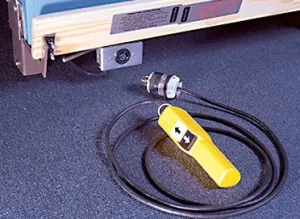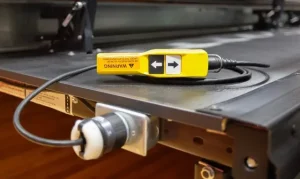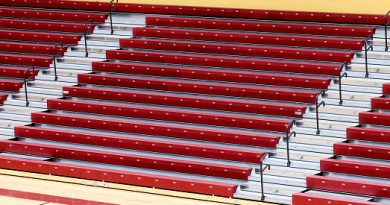Understanding Traditional Pendant Controls for Gym Bleachers: Hussey, Sheridan, and Interkal

For decades, the traditional pendant control has been the heart of every motorized gym bleacher system. Whether your school bleachers were made by Hussey Seating, Sheridan Seating, or Interkal, chances are you operate them using a simple, wired control box — usually with just two buttons: IN and OUT.
While the design seems simple, the pendant plays a vital role in safety, operation reliability, and system lifespan.
In this post, we’ll look at how these pendants work, what to check during operation and maintenance, and when it might be time to replace one.
 How Traditional Pendant Controls Work
How Traditional Pendant Controls Work
Traditional pendant controls are wired handsets that connect directly to the bleacher’s electrical control box.
Each manufacturer has its own slight variations, but the core function is always the same:
-
- Press OUT → the bleachers extend.
-
- Press IN → the bleachers retract.
The pendant communicates with the reversing contactors or control relays inside the electrical panel, allowing the operator to manually control the direction of the motor.
Most pendants are also connected through a key switch or interlock, ensuring that only authorized personnel can operate the bleachers.

 Common Types by Manufacturer
Common Types by Manufacturer
1. Hussey Seating Pendant Controls
-
- Usually rectangular metal or hard-plastic housings with two large rubber buttons.
-
- Marked “IN / OUT” or “RETRACT / EXTEND.”
-
- Connects via a coiled or straight cable with a 4-pin plug.
-
- Often paired with a key switch box for safety.
Typical Issue: Over time, cable insulation wears or connector pins loosen, causing intermittent operation.
2. Sheridan Seating Pendant Controls
-
- Sheridan pendants are similar in appearance but may use custom pushbuttons inside.
-
- Often built with metal enclosures for durability.
-
- Can have a custom 4- or 5-wire plug depending on motor control circuit.
-
- Frequently mounted on a pendant reel for easy storage.
Typical Issue: Switch contact wear from frequent use — leading to “dead” buttons or delayed response.
3. Interkal Pendant Controls
-
- Compact, lightweight design, often plastic with rubberized grip.
-
- Uses simple two-button momentary contact setup.
-
- May have an indicator light or label plate for motor direction.
-
- Connects via twist-lock or plug-in receptacle near bleacher power panel.
Typical Issue: Plug connectors can become oxidized, especially in humid gym environments, causing unreliable operation.
 What to Look for During Operation
What to Look for During Operation
Regular operation checks help prevent costly downtime.
When you run your bleachers:
-
- Listen for unusual sounds — grinding or hesitation may indicate a motor or contactor issue.
-
- Inspect the pendant cable — look for cracks, cuts, or flattened sections.
-
- Check the connector plug — make sure it fits tightly and shows no corrosion.
-
- Confirm button response — both IN and OUT should respond smoothly without sticking.
-
- Observe motor reaction — if the bleachers hesitate or move inconsistently, the pendant might be delivering poor signal contact.
 Maintenance Tips
Maintenance Tips
A simple maintenance routine can extend pendant lifespan and improve safety.
| Maintenance Task | Recommended Frequency | Notes |
|---|---|---|
| Visual cable inspection | Monthly | Replace if damaged or frayed |
| Button functionality test | Each use | Ensure smooth travel and click |
| Connector cleaning | Every 6 months | Use contact cleaner on plug pins |
| Mounting point check | Every 6 months | Verify strain relief and bracket |
| Full electrical test | Annually | Should be performed by a certified technician |
Tip: If your pendant is constantly being unplugged and coiled, consider installing a retractable cord reel to prevent wear and tripping hazards.
 When to Replace a Pendant Control
When to Replace a Pendant Control
A pendant control doesn’t last forever — especially in busy gyms.
Here are signs it’s time for replacement:
-
- Buttons are sticking or not responding.
-
- Bleachers only move in one direction.
-
- Visible cable damage or loose plug ends.
-
- Electrical arcing seen or heard at connection point.
-
- Control enclosure cracked or corroded.
Most schools replace pendants every 3–5 years, depending on usage and environment.
Replacement units are available for most manufacturers through local distributors or online suppliers (like SegaEquipment.com, for example).
 Safety Reminder
Safety Reminder
Never bypass a pendant or key switch for convenience.
These controls are designed with momentary contact — the bleachers should stop the instant the button is released.
Bypassing this safety feature can cause serious injury or equipment damage.
 Looking Ahead
Looking Ahead
While pendant controls remain common and reliable, many schools are now upgrading to Smart Control Hubs — wall-mounted touchscreen systems that centralize bleacher operation, add safety interlocks, and reduce wiring maintenance.
If you’re managing older bleachers from Hussey, Sheridan, or Interkal, a smart control retrofit can modernize your system without replacing the seating structure.
 Need Help Finding the Right Replacement Pendant?
Need Help Finding the Right Replacement Pendant?
GymBleachers.co can help you identify and source compatible pendants for most major manufacturers — or upgrade to a new Smart Control Hub for multi-section control.


